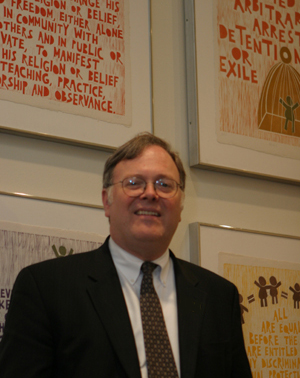A Message from the Director

The International Center for Law and Religion Studies was formally established and commenced operations as of January 1, 2000, to provide the institutional base for our long-term initiatives in the field of law and religion throughout the world. During the succeeding decade, we have emerged as a recognized leader in the field of religious rights, both at the national level in the United States and internationally. Work in the United States has included Congressional testimony in support of draft legislation and participation in numerous conferences in the U.S. Internationally, ICLRS personnel are now instrumental in organizing and participating in 20-30 regional conferences and law reform consultations each year in countries around the world.
For me, the work in a sense began another decade earlier, in early 1990, not long after the disintegration of communist regimes in Eastern Europe when I was taken to meet with a group of university political science professors in a bleak but newly hopeful Romania. Some of you will have heard this story before, of my astonishment at their request: “Could you show us or get us a copy of a constitution? We have never seen one.” The experience was one of many in those years of so much swift and surprising social change that reinforced my determination to bring together what I knew to be the particular talents of BYU Law School faculty and students with scholars, legal professionals, and government and religious leaders in all parts of the world, in friendship and productive dialogue that would help build laws that would create, teach, and bolster notions of and structures for liberty, and very importantly religious liberty, in many parts of the world.
You can read more on the ICLRS website of our progress from international issues of the BYU Law Review to our current worldwide efforts. We have by now brought some 800 experts in law and religion from more than 100 countries to the Law School to present, to discuss, to teach, and to learn. We have enjoyed the support of hundreds, perhaps even thousands of volunteers in this effort, and in our effort to expand our international web presence. Much more help will be needed. While we cannot promise worldly recognition for the work, we can promise to share its many rewards with as many of you as would be willing to join us in it.
We eagerly anticipate another decade of advancement in the freedom of religion, conscience, and belief worldwide, and we hope you will join us in the effort.
Sincerely yours,
W. Cole Durham, Jr.
Susa Young Gates University Professor of Law
Director, International Center for Law and Religion Studies
Brigham Young University
About the Center
[Background on Cole]
The first Symposium in 1964. For six years Cole …. In 2000 the Law School
General Background. BYU International Center for Law and Religion Studies was founded in Spring 2000 to promote freedom of religion and belief throughout the world. Building on the extensive efforts and contacts of BYU law school faculty, the Center has in its first decade already established genuine international stature as an academic institution for the study of religious rights and a broader array of issues at the intersection of law and religion.
Because religion is central to the life of every nation and culture, and because issues in this sensitive area are often contested, the boundaries between religion and the state are subject to constant readjustment throughout the world. Virtually every resulting legal shift can have vital practical ramifications for sincere believers from a wide array of faith traditions, particularly our own. Not surprisingly, there is a growing recognition in academic, government and human rights circles of the importance of understanding these vital church-state and religious freedom issues. The same impetus is felt with even greater force within The Church of Jesus Christ of Latter-day Saints. Religious freedom is a central doctrinal tenet of the Church, and is vital to its mission. Both scriptural sources and statements by Church leaders have long drawn attention to the importance of studying constitutional law, especially with respect to freedom of conscience.
BYU’s Expertise in Religious Liberty Issues. Over the past decade, through the work of Professor W. Cole Durham, Jr., the Director of the BYU Center, and a number of other faculty members, BYU has emerged as a recognized leader in the field of religious rights, both at the national level in the United States and internationally. Work in the United States in support of the Religious Freedom Restoration Act and the Religious Liberty Protection Act is a significant example of such contributions in the United States. At the international level, BYU has hosted a series of conferences on international religious freedom issues that have attracted leading church-state officials and experts from many countries, and Professor Durham has been instrumental in organizing expert conferences and law reform consultations in most of the countries of Eastern Europe.
Professor Durham has been recognized for his work through multiple honors, including a University professorship, appointment as co-chair of the Advisory Panel of Experts on Freedom of Religion or Belief of the Organization for Security and Co-operation in Europe, and an opportunity to serve as an Executive Board member of the International Academy for Freedom of Religion and Belief.
The Unique Advantages of the BYU Center. With the unique language and other international resources of its students and faculty, and with the institutional commitment to religious freedom of its sponsoring Church, the BYU Center for Law and Religion Studies is uniquely positioned to become one of the leading Centers for the study of religious rights in the world. The Center focuses both on domestic U.S. issues and on international matters. However, the international and comparative focus gives the BYU International Center for Law and Religion Studies a distinctive niche among Centers in the United States.